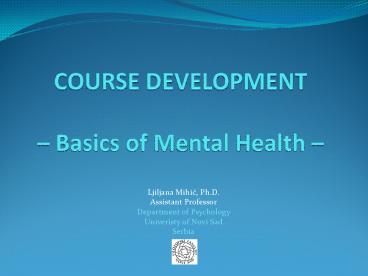COURSE DEVELOPMENT Basics of Mental Health
1 / 20
Title:
COURSE DEVELOPMENT Basics of Mental Health
Description:
... research behind the concepts, techniques and excercises that enhance well-being; ... PP Exercises ... on how they completed the exercises; they were engaged ... –
Number of Views:42
Avg rating:3.0/5.0
Title: COURSE DEVELOPMENT Basics of Mental Health
1
COURSE DEVELOPMENT Basics of Mental Health
- Ljiljana Mihic, Ph.D.
- Assistant Professor
- Department of Psychology
- Univeristy of Novi Sad
- Serbia
2
Purpose
- An introduction to the science of mental health,
prevention of mental illness, promotion of mental
health, stress and coping, and positive
psychology. - Third-year B.A. level course
- Lectures Tutorials
3
- Objectives
- learn about different models of mental health,
prevention of mental illness, and promotion of
mental health - learn about the nature of the stress
response and its impact in the etiology and
course of many health problems - learn how behavioral and cognitive methods
can help individuals cope with stress
4
- develop an understanding of the dimensions of
subjective well-being - appreciate and critically evaluate research
behind the concepts, techniques and excercises
that enhance well-being - develop skills for designing psychosocial
prevention programs
5
Course Components and Marking
- Teaching, discussions, tutorials, and
participation in a seven-day experiential
activity - The final mark
- mid-term exam (40)
- final exam (30)
- class participation and participation in an
- experiential exercise (10)
- written paper (small-group activity)(20)
6
Mental HealthPrevention and Promotion
Rickwood,2005
7
WHO, 2004
8
Triple P Positive Parenting Program (Sanders et
al., 2003)
9
Students Participation
- Lectures discussions
- Tutorials a TA demonstrated the main components
of preventative psychosocial program using
real-life examples from our communities (shelters
for abused women and their children in Ni,
Serbia, preoperative preparation in children) - Small-group written projects select a targeted
group and write a psychosocial program - primary prevention of anxiety disorders
- providing support to families with children with
special needs - dealing with loss and trauma
- prevention of bullying
10
Mental Health Stress and Coping
- Lectures
- Stress as reaction (e.g., General Adaptational
Syndrom, McEwens alostatic theory) - Stress as stimulus (the amount of life
change,chronic and episodic life events,
dependent and independent life events) - Stress as transaction (Lazarus Folkman, 2004)
- Coping dispositional and situational approaches
11
Mental Health Stress and Coping
- Tutorials
- stress inoculation exercises
- basic principles of leading and participating in
workshops - directed fantasy
12
Positive Psychology
- Lectures
- What is Positive Psychology and why?
- The role of positive emotions
- Can we increase happiness?
- Optimism, optimistic explanatory style
- Hope
- Strengths and virtues
13
PP Exercises
- seven-day experiential exercise to experience
the positive psychology constructs first-hand,
and to begin to appreciate complexities related
to the process of program evaluation - Students completed the exercises at the
beginning of the - course prior to exposure to PP content
- Pre-test and post-test Self-Reported Dysphoria
Scale ( (Novovic et al., 2007) and Satisfaction
with Life (Diener et al., 1985)
14
Using Your Strengths (Parks Seligman, personal
communication)
- Look at the list of 24 strengths provided in your
workbook and decide what 5 strengths represent
you the most. Every day for the next week, use
one of these strengths in a way that you have not
been before. Each night, write down how you used
one of your strengths that day, including what
strengths you use, how you felt before, during,
and after the activity, and whether you plan to
repeat it in the future. - Provided examples on how to use strengths in
novel ways
15
Three Good Things
- Each evening before bed, write down three things
that went well that day. These things can be
ordinary and small in importance or relatively
large in importance. Next to each positive event
in your list, answer the question Why did this
good thing happen?
16
Events of an Acquaintance
- Each evening before bed for the next week,
describe an event that occurred to your
acquaintance that day. Describe what happened and
your reactions. It is preferable that you did not
participate in the event and that you learned
about it through your acquaintance.
17
Cohens d .42
Satisfaction with Life (alpha .80) Time F
(1,140) 8.27, p lt .01 Time X Condition F(2,140)
3.99, p lt . 05
18
Dysphoria (alpha .93) Time F (1,141) 8.81, p
lt .01 Time X Condition F (2,141) 3.03, p .051
19
Discussions with Students
- feedback on how they completed the exercises
they were engaged - while described other peoples events
- randomization
- importance of right placebo group i.e.
comparison group - effect size or practical significance of results
- why the signature strengths exercise did not
work? Importance of - longer follow ups, how long is long enough?
20
Students Evaluations
- General evaluation of the course (from 5 to 10)
- 8.5
- General evaluation of the teacher
- 8.7
















![Maharashtra University of Health Sciences [MUHS], Nasik](https://s3.amazonaws.com/images.powershow.com/9667657.th0.jpg?_=20211003038)














